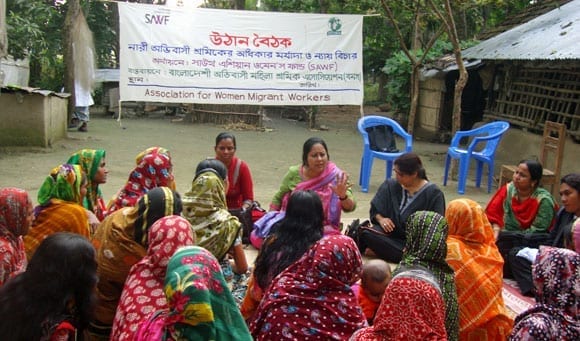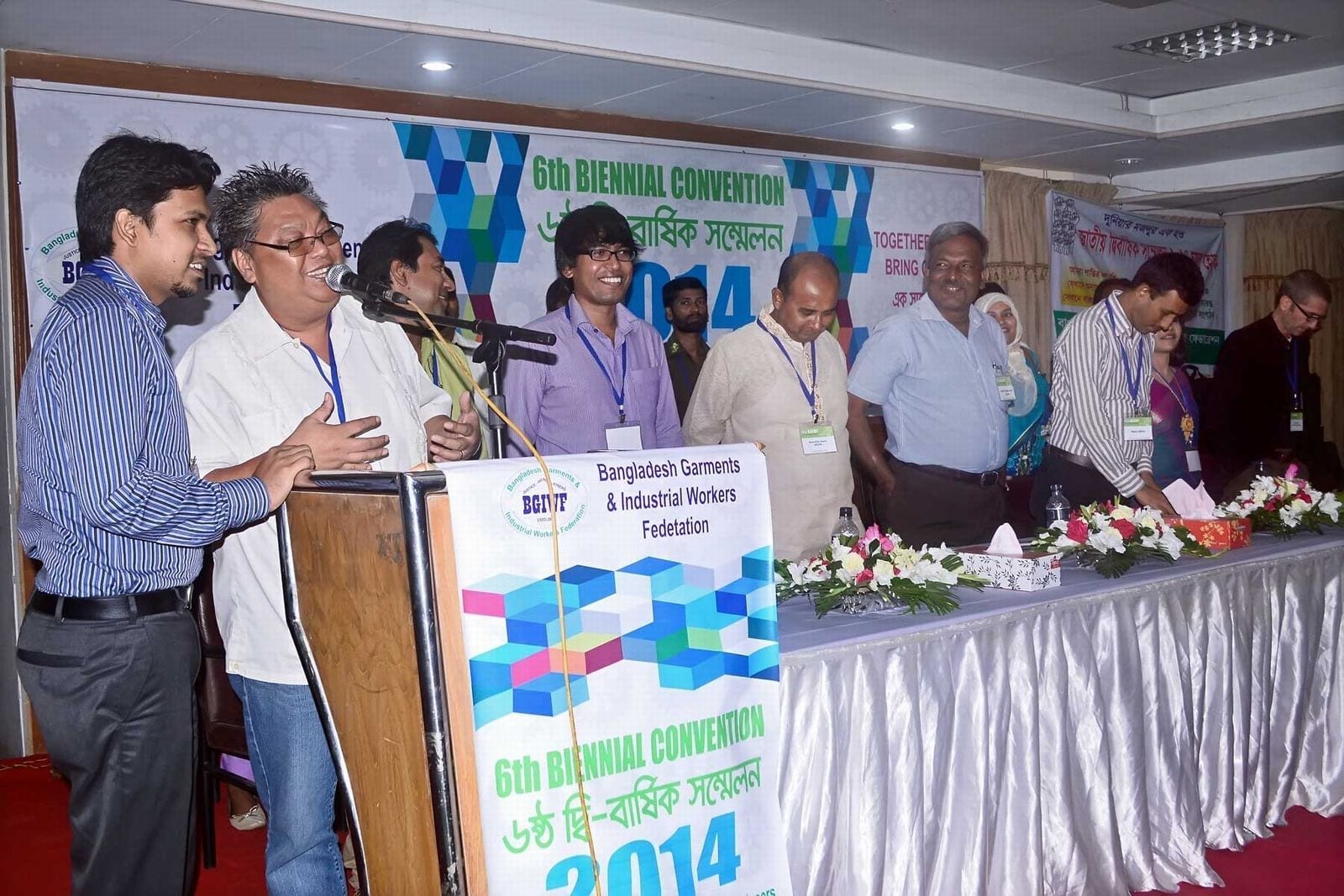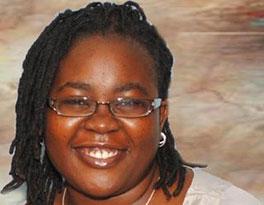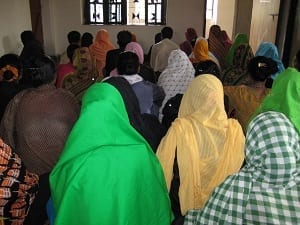
Sep 19, 2014
Three times each month, dozens of women gather in dusty courtyards in rural towns in Manikganj, Dinazpur or other districts across Bangladesh to learn all they can about the only means by which they can support their families: migrating to another country for work.
In leading these information sessions, the Bangladesh Migrant Women’s Organization (BOMSA) seeks to assist women in understanding their rights—from what they should demand of those who facilitate their migration, to the wage and working conditions at the homes in Gulf and Asian countries where they will be employed as domestic workers.
“What I want for these women is that they are safe, they get their wages,” said Sheikh Rumana, BOMSA general secretary. Rumana founded the organization in 1998 with other women who worked with her for years in Malaysian garment factories. Before she migrated for work in Malaysia, Rumana was promised a good salary at an electronics plant. But when she arrived, she was put to work at a plant making jackets and paid pennies for each piece she sewed.
The gap between the promise and reality of migrating for work overseas is the focus of migrant worker activists across Asia. This month, Rumana and seven other migrant worker activists from Bangladesh, India and the Maldives are traveling across the United States as part of a Solidarity Center exchange program supported by the U.S. State Department. The group is meeting with U.S. activists working on labor rights, migrant rights and anti-human trafficking issues in Washington, D.C., New York and Los Angeles to discuss best practices to promote safe migration and share ideas for raising awareness about the risks of migrating for work.
Like BOMSA, the Welfare Association for the Rights of Bangladeshi Emigrants Development Foundation (WARBE-DF) assists those seeking to migrate, provides support for workers overseas and assists them upon their return. The organization also has successfully pushed the Bangladeshi government to ratify the United Nations (UN) convention on the protection of migrant workers, and is campaigning for passage of the International Labor Organization (ILO) convention covering decent work for domestic workers, said Jasiya Khatoon, WARBE-DF program coordinator and Solidarity Center exchange participant.
“Lack of job opportunities” is what drives millions of Bangladeshis out of their country in search of work, Khatoon said. Some 8.5 million Bangladeshis are working in more than 150 countries, according to 2013 government statistics.
Many workers migrating from Bangladesh and elsewhere are first trafficked through another country—where a lack of proper documentation may result in their arrest. In Mumbai, India, a transit point for many migrants, human rights lawyer Gayatri Jitendra Singh works both to assist imprisoned migrant workers and to change the country’s laws so that, rather than penalizing migrant workers, the laws recognize the culpability of traffickers and corrupt labor brokers.
Singh, a former union organizer, and other migrant advocates, point to the actions of labor brokers as the biggest underlying problem in the migration process. Many labor brokers charge such exorbitant fees for securing work that migrant workers cannot repay them even after years on the job, essentially rendering them indentured workers. They remain trapped, often forced to remain in dangerous working conditions because their debt is too great. Unscrupulous brokers also lie about the wages and working conditions workers should expect in a destination country, the migrant advocates say.
Singh and the other migrant advocates came to the United States filled with fresh stories about the suffering of migrant workers and their families: a Bangladeshi domestic worker in Jordan and another in Lebanon who had just returned to Bangladesh, still suffering the effects of nightly sexual abuse by their employers; the family of an Indian construction worker who died in Qatar and is unable to pay for the return of his body; the 12-year-old Bangladeshi girl whose passport cites her age as 25 so she can migrate overseas to support her family because her father is ill.
Bangladeshis “wouldn’t go if there were jobs in their country,” said Rumana. But faced with grinding poverty and no chance for decent work in Bangladesh, they uproot their lives to make a living. But as long as they do, Rumana said, they “shouldn’t have to be tortured to have work.

Sep 16, 2014
Some 600 factory-level garment union leaders and workers from 35 factories met during the recent Bangladesh Garments and Industrial Workers Federation (BGIWF) Convention in Dhaka, the Bangladesh capital.
Joining together under the convention theme, “Together we can bring change,” participants described the workplace improvements that followed after workers formed unions.
“Before forming the union, the workers were abused in different ways. For instance, if the production target was not fulfilled, management terminated them,” said Md. Khokhon Skikdar, general secretary of Lufa Garments Ltd. “But now, they (the managers) value us and hold mutual discussions.”
Tania Akhter, general secretary, Luman Fashion Workers Union, said before workers formed a union at Luman, “if any worker could not fulfill the production target, management forced them to work without any payment.” Now with union representation, “they receive earned leave pay, maternity leave and overtime wages due them as guaranteed by the labor law of Bangladesh. They are ensured of their rights after getting involved with union activities in the factory.”
Through their union, workers have achieved concrete workplace improvements “which were quite impossible earlier,” said Salma Akhter, joint general secretary of Winy Apparels Workers Union. “After forming a union, we increased our evening shift bill and got maternity leave.”
Participants also said the sixth annual BIGUF convention enabled them to expand their knowledge and skills and network with their peers.
“This type of convention gives us an opportunity to meet other union leaders and to get closer to each other,” said Skikdar. “Not only the leaders joined the program but also the members of the union were here.”
Mim Akhter, general secretary of the Dress and Domestic Workers Union, said she learned a lot speaking with other union leaders and now plans to “spread that knowledge among the general workers of the factory.”
Mim took part in training programs where she said she gained helpful knowledge, especially “how to deal with management” and “what is good and bad for the workers.”
Tania Akhter said the convention allowed factory leaders the meet and discuss mutual issues. “I feel very happy after seeing lots of workers together under one roof. As a leader, I am always trying to play a significant role in establishing worker rights,” she said.
Alonzo Suson, Solidarity Center Bangladesh country program director, IndustriALL’s Roy Ramesh and Rob Wayss, from the Bangladesh Accord on Fire and Building Safety, attended the convention as guests.
Unions participating included: Rokhsana Knit and Composite Workers Union; Miti Apparels Ltd. Workers Union; Fashion Island; Lucid Apparels Ltd. Workers Union; Lyric Industrial Workers Union; M F Apparels Workers Union; B Brothers Workers Union; Natural Apparels Ltd. Workers Union; Style Fashion Workers Union; BP Garments Workers Union; Essex Ltd. Workers Union; Four S Apparels Workers Union; Jisas Fashion Workers Union, Solar Garments; Super Shine Apparels Ltd. Workers Union; Workers Union; GNG Fashion and Fabrics Ltd. Workers Union; Overseas; Mega Star Apparels Ltd. Workers Union; Green Granite; Apollo Swing and Garments Ltd. Workers Union; New Morning Apparels Ltd. Workers Union; Global Knitwear Workers Union; Isabpur Workers Union; Aramic (Cement) Workers Union; Lokhipur Chingripona (Shrimp) Workers Union; Grameenphone union; and the Dockyard Union.

Sep 15, 2014
Unions in Liberia and Nigeria are teaching union members, their families and local communities how to prevent transmission of the Ebola virus and speaking out on behalf of health care and other front-line workers.
The United Workers’ Union of Liberia (UWUL) and the Firestone Agricultural Workers Union of Liberia (FAWUL) announced a joint action plan last month and are currently directing community-based health education trainings for protection against transmission of Ebola virus disease (EVD).
The Movement for Labor Rights and Justice (MOLAJ)—a grassroots organization with links to UWUL and FAWUL—is providing Ebola awareness training, disinfectants and hand-washing buckets to Liberian communities.
“We wants to use [MOLAJ] to launch an S.O.S. call to all our partners to assist in any way possible to combat this dreadful EVD in our country to save the lives of workers and their families,” says David Sakoh, UWUL general secretary. MOLAJ’s efforts were boosted by a $15,000 donation from the United Steelworkers (USW) last month.
An effective union response is critical in Liberia. The World Health Organization (WHO) concluded last week that—with 14 of Liberia’s 15 counties having confirmed cases—the Ebola outbreak has completely outstripped the Liberian government’s ability to respond.
Unions in Nigeria are playing an important role in getting information to the grassroots about how to prevent Ebola infection and taking the lead in pressing for protection protocols for healthcare and other front-line workers.
The National Association of Nigerian Nurses and Midwives (NANNM), the Medical and Health Workers’ Union of Nigeria (MHWUN), and the Union of Textile Garment and Tailoring Workers of Nigeria (NUTGTWN) are conducting trainings for members as well as providing train-the-trainer workshops in communities, so as to broaden their outreach and better equip workers and communities to fight the infection.
The Nigeria Labor Congress (NLC) and several Nigerian sector unions are also distributing posters and handbills that explain Ebola and how workers can protect themselves and care for others, through local branch offices. In addition, the federation and several sector unions are calling for personal protective devices for at-risk workers and for the government to issue standard protocols for health care and other workers likely to be exposed to the virus—including port workers, air transportation workers and border workers. Unions representing healthcare workers are distributing union-printed copies of a WHO document providing infection prevention techniques for healthcare workers.
Last month the WHO reported that 12 Ebola cases were successfully contained within Lagos. Recently, though, several cases were confirmed in Port Harcourt, Rivers State. By September 8, 477 people were under quarantine in Port Harcourt and by last Friday that number had risen to 490.
The Ebola outbreak has killed more than 2,000 people across West Africa, including Liberia, Guinea, Sierra Leone and Nigeria and Senegal. Last week the WHO estimated that as many as 20,000 people in West Africa may become infected.

Sep 12, 2014
Up to 80 percent of workers across Africa labor in the informal economy, many as street vendors, taxi drivers and domestic workers. With few legal rights, most informal-sector workers make low wages and have no health care or other social protections.
Because women comprise the vast majority of workers in the informal economy, they are integral to improving wages and working conditions for all informal workers. Indeed, says Caroline Mugalla, executive secretary of the East Africa Trade Union Confederation (EATUC): “The key to development in Africa is empowering women.”
Mugalla traveled to Washington, D.C., in August, where she and nearly 40 African trade union leaders met to ensure participants in the high-level U.S.-Africa Summit included “decent work” on their agenda. Although “Africa rising” has become a popular catchphrase for the continent’s economic momentum, only the top 1 percent are benefiting. Most Africans are unable to secure decent work—which includes good wages, safe working conditions and the freedom to form unions and collectively bargain.
For many unions, the first step to empowering women workers is addressing their own power structures, a process Mugalla led for several years within the EATUC, a regional confederation that includes labor federations in Burundi, Kenya, Rwanda, Somalia, Tanzania, Uganda and Zanzibar. EATUC’s constitution was “silent on the issue of gender,” Mugalla said, so in 2009, she and others began drafting language to ensure gender equality became a key part of it.
Over the next three years, union leaders hosted regional committee meetings with women to hear their concerns and develop recommendations for the EATUC governing body. The International Labor Organization (ILO) and Solidarity Center held leadership trainings for women and assisted union leaders in crafting new language for the constitution. The union women also held the all-male general secretaries accountable for approving it, says Mugalla.
Now with passage of the new constitution, Mugalla says “women need to be trained at the shop floor so they can become leaders—stewards, regional officers, national officers.”
In reaching out to workers in the informal economy, unions in East Africa provide an opportunity for women to share in the region’s prosperity. Tanzania unions have organized female street vendors who sell beads, sandals, wood carvings and other crafts, providing them with valuable information on the market price for their goods. “Women make up the majority in East Africa, make up the majority of people living below the poverty line,” says Mugalla. “A woman who is economically empowered can made decisions on her own.”
As a collective trade union voice in East Africa, EATUC is pressing for strong worker protections in trade agreements such as the African Growth and Opportunity Act (AGOA). AGOA, which gives eligible sub-Saharan countries duty-free access to the U.S. market for a variety of products, is up for re-authorization in 2015. In the 15 years AGOA has been in effect, it has increased exports from sub-Saharan Africa, but by focusing mostly on tariff reductions, it has not spurred broader development or fostered a robust and equitable economic system, Mugalla says.
AGOA covers products made in the textile sector, which is nearly entirely composed of women workers. The EATUC is working to ensure AGOA and other such agreements do not increase the number of low-skilled jobs but provide women and young workers “employment that gives them the opportunity to access social services, job security,” says Mugalla.
Empowering women economically, fundamental to advancing progress across Africa, can only happen when gender equality is recognized across the board. Or as Mugalla says:
“The day that gender becomes a man’s issue is the day we have made a lot of progress.”

Sep 9, 2014
A garment union leader and her husband were brutally attacked in late August, marking the latest incident of apparent factory-sponsored violence against workers attempting to exercise their right to freedom of association and to just, safe jobs in Bangladesh’s garment factories.
In August 26 as Mira, acting union president at Global Trousers Ltd. in Chittagong, and her husband waited for the bus to take them home after work, several men—armed with iron rods, their faces hidden by handkerchiefs—violently attacked her. She was knocked unconscious following a blow to the head, and her husband, who rushed to help her, also suffered a beating. After the attack, Mira was rushed to a local hospital in critical condition.
The couple report that a low-level manager pointed Mira out to their attackers, and that the men shouted throughout the assault that they would kill the pair unless they resigned from the trade union and left the factory. Days earlier, workers said a group of men with knives were waiting for Mira outside the factory gates, though a change in her routine kept them from carrying out their plan.
In 2011, a new wave of organizing spread across Bangladesh after a long drought when no new independent unions were able to organize. At that time, workers at Global Trousers were among the first to try and organize a trade union—encountering intense resistance from their employer. Although the union met the legal requirements to be registered officially as a trade union, factory management contested its registration, which has since been working its way through the courts. The High Court ruled earlier this year that the case should be transferred to the country’s labor courts but that the union could now legally operate as a trade union inside the factory.
While only three of the original union leaders are left in the factory, union members have continued to persevere under the guidance and leadership of their trade union federation, Bangladesh Independent Garment Workers Union Federation (BIGUF). In the last several months, workers have recruited new members and established a union dues structure through which they are regularly collecting dues from members to continue to build a strong, sustainable organization.
However, management has strengthened its campaign against the union as well. In August, union leaders reported that managers at various levels within the factory told them they would face severe consequences for their activism. On August 22, another union leader reported that men, their faces disguised, dragged her and her husband from their home to attack them but were driven off by people in the community.
The union, with assistance from BIGUF, has filed police reports and sent letters to relevant government officials, the Bangladesh Garment Manufacturers and Exporters Association and other local stakeholders to demand justice for the anti-union acts and for management to respect the union’s legal right to exist. And on September 3, union leaders joined with other BIGUF union members and other labor allies to draw attention to the issue in front of the National Press Club in Dhaka. To date, the perpetrators of the assaults remain at large.





